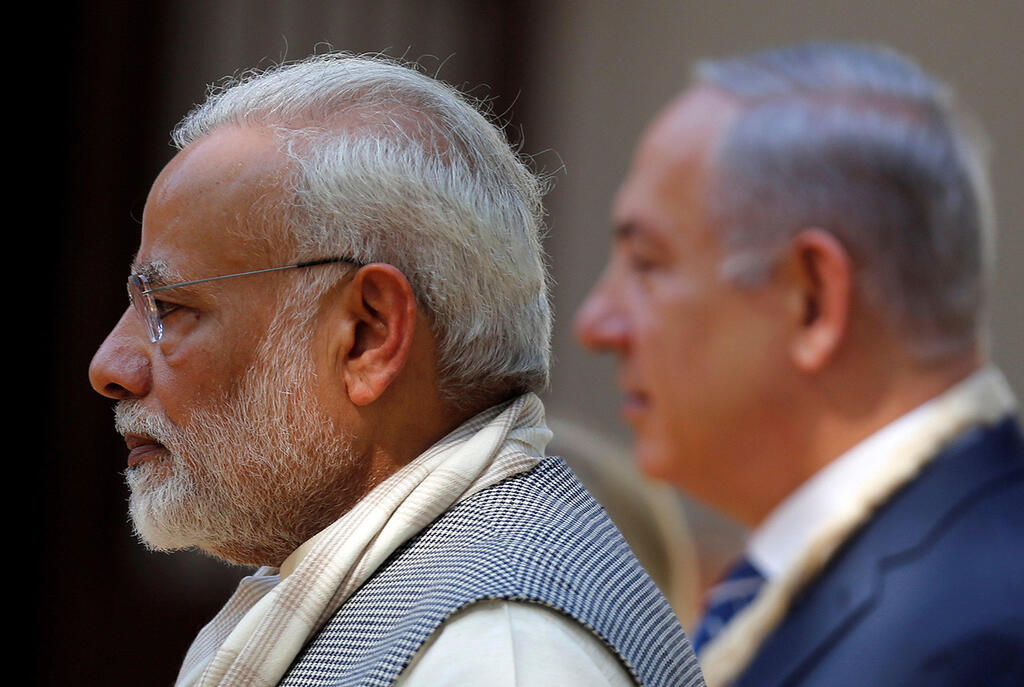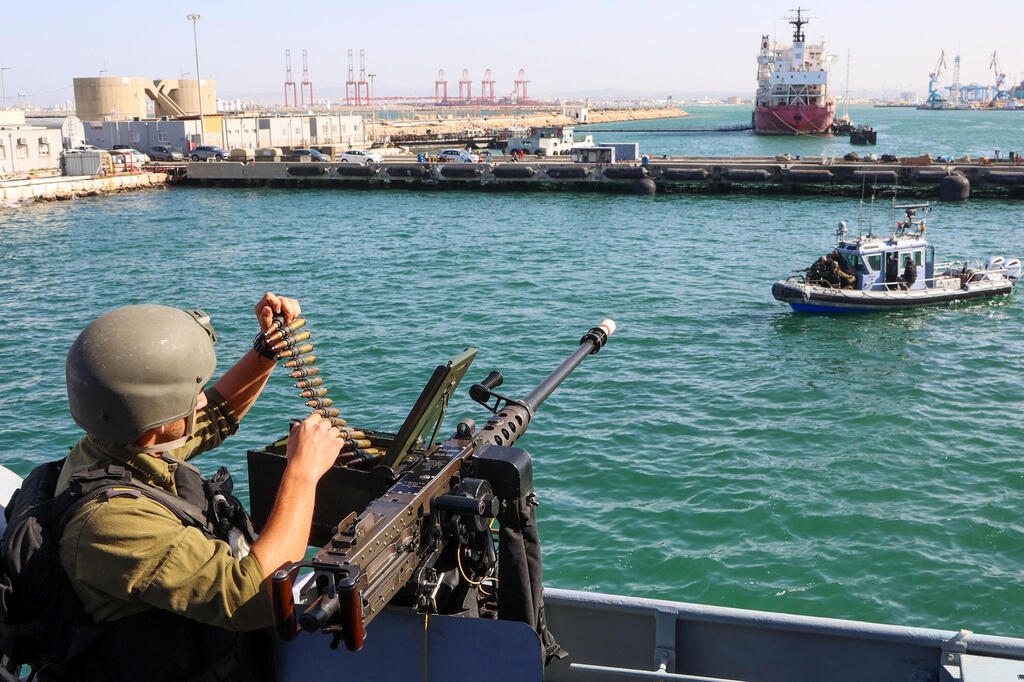Getting your Trinity Audio player ready...
There has been a remarkable metamorphosis in Indo-Israeli relations over the past three decades. Just over 40 years ago, India issued a postage stamp depicting the Indian and Palestinian flags flying side by side and the words “Solidarity with the Palestinian people.” By contrast, today the two countries have developed significant military ties.
Indian and Israeli flags are now displayed together at rallies demonstrating solidarity with Israel after the October 7 attack. In October, Prime Minister Narendra Modi immediately condemned the Hamas attack and later reiterated that the “people of India stand firmly with Israel in this difficult hour.”
3 View gallery


Indian Prime Minister Narendra Modi and Israeli counterpart Benjamin Netanyahu
(Photo: Reuters)
India now Israel’s largest buyer of military hardware
Since the 1990s, naval spheres have appeared particularly amenable for expansive bilateral collaboration between India and Israel and worthy of decisive U.S. support. Cooperation in this area has continued to offer intriguing possibilities that can serve both India’s declared aim to develop a blue-water navy and Israel’s increasingly challenging geo-strategic needs.
By 2016, military business between the two nations had indeed flourished to a multi-billion dollar enterprise and India has now emerged as the largest buyer of Israeli military hardware. India now purchases over $2 billion worth of weapons annually from Israel which includes missiles, drones, bombs and border-security equipment.
Israel’s future naval capabilities are key
The Houthi leadership has already openly proclaimed that it intends to disrupt international shipping to bring pressure to bear on Israel to halt its military operations against Hamas in Gaza.
The implications of Israel’s diminutive geographic size have been exacerbated by the acquisition by its non-state adversaries of an increasingly menacing array of missiles, rockets and UAVs, some of them with precision guidance.
The enhanced status of the Israeli Navy in the face of this threat can perhaps be gauged by the fact that the most expensive weapons in the entire IDF—new Air Independent Propulsion (AIP) submarines—are designated for its use. The three new vessels on order are priced at a total of almost 3.5 billion dollars - a price tag that dwarfs that of the IAF’s much-vaunted F-35, its most sophisticated and costly aircraft.
It is not beyond the realm of feasibility therefore to envisage Israel acquiring the know-how to co-produce its own nuclear submarine fleet as well as to comprise what would, arguably, be the ultimate second-strike capability.
Israel has already proven that it has the ability to manufacture top-class supersonic fighter jets, launch satellites and produce unrivaled multi-layer missile defense systems. The Israeli Navy by all accounts is emerging as a major—indeed, vital—strategic arm for Israel’s defense—particularly regarding the provision of a mobile and elusive platform for second-strike capability in the vast expanses of the ocean.
Red Sea, Indian Ocean threats encourage Indo-Israeli naval cooperation
The current military confrontation between the Houthis, supported and guided by Iran, and Israel and the U.S.-led international maritime coalition highlights the gravity of the threat to global and Israeli freedom of navigation in the Red Sea and the Indian Ocean.
India and Israel have a further scope of cooperation in marine security and potential benefits from close collaboration in this sphere. These new adversaries endanger both Israeli and Indian interests at sea. Since much of India’s economy relies on maritime commerce, India stands to lose tens of billions of dollars this year because of a war far from its border as the Houthi attacks have forced Indian ships to sail around the Cape of Good Hope instead of the shorter route through the Suez Canal.
Significantly, on several different occasions, the Indian Navy has responded to distress calls from commercial ships attacked by Houthi missiles, underscoring the shared perils to which both nations are subject.
India’s vast border challenges can benefit from Israel’s know-how
Of course, as a huge sub-continent, with an almost 8000 km shoreline of its own to secure and protect, India’s maritime requirements are very different from those of Israel. These vast differences do not diminish the scope of potential cooperation between the two nations including in the naval sphere.
There has been impressive advancement in the capabilities of the Indian navy, which New Delhi increasingly sees as vital in meeting its security challenges from Pakistan and strategic challenges from China. Clearly, with its proven technological capabilities, there is little doubt that Israel is in a unique position to make a far-reaching contribution to these Indian endeavors.
Meanwhile, diminishing U.S. strategic support for Israel because of a widening gap in national interests is a contingency that must be planned for. In this regard, India as the world’s fifth-largest economy should be seen as a vital partner in future strategic enterprises—in which the naval sector should play a crucial role.
Of course, it is not intended that India replace the U.S. as Israel’s major strategic partner—the proposal here is that it should play the role of an important strategic supplement rather than an overall strategic alternative.
Israel should continue to invest in enhancing the cooperation with the U.S. in this context and build a regional naval security regime together with the U.S., and other democracies (including India) and pragmatic Arab states that would guarantee safe passage in international waters. This is necessary to enable the implementation of the grand plan of establishing a maritime and ground route of trade from India to Europe through the Arab peninsula, Jordan and Israel.
Ultimately, unless you are a maritime power you can never aspire to be a global power. The question remains therefore as to who will dominate the Indian Ocean, the eastern approaches to Europe, and south and central Asia–powers that commits to the preservation of enlightened values of moderation and restraint. In this respect, it is hopeful that Indo-Israel naval cooperation can certainly comprise a sturdy bulwark against the menacing rise of these dark forces.
Martin Sherman is a member of IDSF-Habithonistim - Israel's Defense and Security Forum




